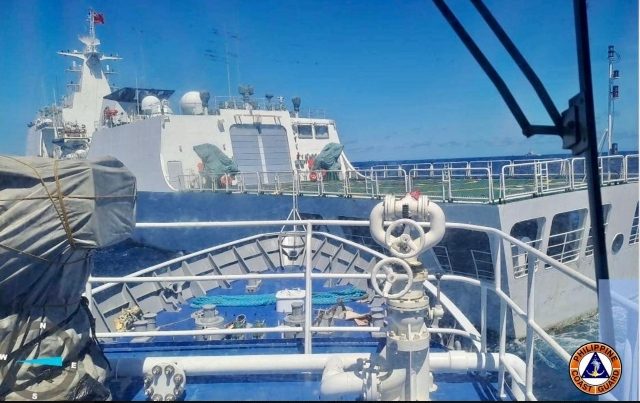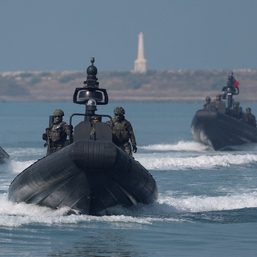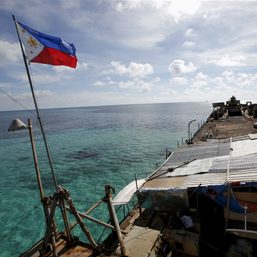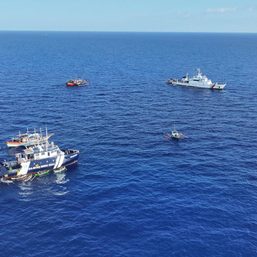SUMMARY
This is AI generated summarization, which may have errors. For context, always refer to the full article.

MANILA, Philippines – The United States, Canada, Australia, Japan, and the European Union on Sunday, August 6, expressed support to the Philippines as one of its vessels was subjected to yet another aggression by the Chinese Coast Guard (CCG) during a routine resupply mission to Ayungin Shoal.
The US State Department said that China’s ships “interfered with the Philippines’ lawful exercise of high seas freedom of navigation and jeopardized the safety of the Philippine vessels and crew.”
“Such actions by the PRC (People’s Republic of China) are inconsistent with international law and are the latest in repeated threats to the status quo in the South China Sea, directly threatening regional peace and stability,” the US said.
This statement comes after a chartered supply boat of the Armed Forces of the Philippines (AFP) was unable to complete its routine troop rotation and supply drop on Saturday, August 6, after it was blocked and water cannoned by a CCG vessel.
The US added that an attack on the country’s public vessels, aircraft, and armed forces “would invoke the US mutual defense commitments under Article IV of the 1951 US Philippines Mutual Defense Treaty.”
‘Dangerous and provocative’
Canada said that it “unreservedly condemns the dangerous and provocative” actions of the CCG. The country also reiterated its support for international law as “continued acts of intimidation and coercion by [China] against its neighbors undermine safety, security, and stability across the region, and raise the risks of grave miscalculations.”
“Unsafe maneuvers and use of water cannons to disrupt the lawful operations of Philippine vessels is unacceptable, and inconsistent with the obligations of the People’s Republic of China (PRC) under international law,” the Embassy of Canada in the Philippines said in a statement.
“Only by ensuring full respect for international law can we collectively set conditions for effective and collaborative management of maritime resources, maintenance of maritime safety and security, preservation of marine biodiversity, and respect for maritime boundaries, while ensuring the rights of all states under international law are protected,” it added.
Australia, Japan, and the European Union (EU) also issued separate statements supporting the Philippines and calling on the respect of the 1982 United Nations Convention on the Law of the Sea (UNCLOS) and the historic 2016 arbitral ruling against China.
“Australia is concerned by the latest actions directed against the Philippines, which are dangerous and destabilizing,” Australian Ambassador Hae Kyong Yu said on Twitter. “We reiterate our call for peace, stability, and respect for UNCLOS in the South China Sea – a vital international waterway.”
Japanese Ambassador Kazuhiko Koshikawa said they “strongly support” the Philippines’ position, highlighting that it is “totally unacceptable any harassment and actions which infringe on lawful activities of the sea and endanger the navigational safety.”
EU Ambassador to the Philippines Luc Véron said they are “very concerned about dangerous action” by China.
“EU stands with the Philippines in upholding the rules-based international order,” he said on Twitter. “The EU supports the legally binding nature of the 2016 South China Sea arbitration.”
Not the first time
This was not the first time that the CCG “harassed” and blocked Filipino vessels. In July, PCG boats were “constantly followed, harassed, and obstructed by the significantly larger Chinese coast guard vessels” during a resupply mission to Ayungin Shoal.
After the latest incident, the AFP urged its Central Military Commission to “act with prudence and be responsible in their actions to prevent miscalculations and accidents that will endanger people’s lives.” But CCG spokesperson Gan Yu said that the coast guard just implemented necessary controls, urging the Philippine side to “immediately stop its infringing activities in the waters.” – Rappler.com
4 comments
How does this make you feel?



![[EDITORIAL] Diplomasya ni Rodrigo Duterte sa Tsina: Nakaluhod nang dikit ang noo sa lupa](https://www.rappler.com/tachyon/2024/05/animated-duterte-china-panatag-shoal-carousel.jpg?resize=257%2C257&crop_strategy=attention)





The problem of China bullying will keep going on till infinity no matter how many diplomatic protests will be filed. This is because the true CAUSE of the problem is NOT identified. And this is because Chinese President Xi Jinping’s friend Former President Rodrigo Duterte, the Good Vibes President Marcos Jr., the silent but suspiciously-China-oriented VP Sara Duterte (based on the assumption of “Like Father, Like Daughter”), all of the China-loving senators and congressional representatives, China-loving private sector, China-persuaded/oriented Justices and Judges, China-loving or afraid part of the Military and the China-fooled groups of the Filipino people – are all the CAUSE of the problem. No wonder why they could not identify what is the TRUE cause of the problem because it is all of these specific persons and group of people who is the True Cause of the problem. And without knowing the True Cause of the Problem, a Correct Solution will never be found.
Definitely agree!
Result of digong”s trip to China???
That’s certainly part of it. The PRC has been notorious in infringing other countries’ exclusive economic zones, but the Duterte and Macapagal-Arroyo administrations have definitely made things worse.